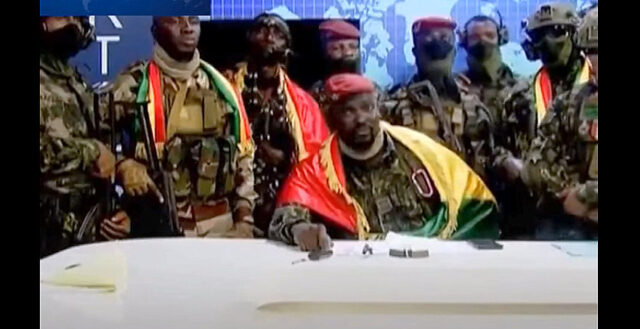
Mutinous soldiers who deposed Guinean President Alpha Condé on Sunday after hours of heavy gunfire around the presidential palace said they did so because of the rampant corruption, disregard for human rights and economic mismanagement under the ousted president.
Mamadi Doumbouya, the 41-year-old colonel who appears to be the leader of the military takeover, said in a statement after a meeting Monday that the army had little choice but to “give the people their freedom.”
Quoting late Ghanaian ex-president John Rawlings who led a coup twice in Ghana, Mr Doumbouya said, “if the people are crushed by their elites, it is up to the army to give the people their freedom.”
“The duty of a soldier is to save the country. We will no longer entrust politics to one man. We will entrust it to the people,” the former French legionary, draped in the red, yellow, and green Guinean flag with about a half dozen other soldiers flanked at his side, said.
The putschists have since seized Mr Condé and his whereabouts or safety is uncertain.
The junta has continued to consolidate power as it announced that it will be replacing Guinea’s governors with regional commanders at an event Monday.
“Any refusal to appear will be considered rebellion” against the country’s new regime, it warned.
Mr Doumbouya noted that after consultations, the modalities for transition will be set out, and then a government of “national union will be established to steer the transition.”
He had earlier said on state television that the government had been dissolved, the constitution suspended and the country’s borders shut.
On Monday, he ordered former ministers to hand over their official vehicles to the military, and told them that they could not leave the country.
He urged mining companies to continue with their activities as they were exempted from the nationwide curfew.
After the meeting, Mr Doumbouya drove around the capital Conakry, BBC reported.
The medium added that a happy crowd, some undressed, were seen chanting “Doumbouya, Doumbouya, Doumbouya” and “freedom, freedom, freedom.”
This is believed to capture the mood of some Guineans who were tired of Mr Condé’s reign, especially because despite the country’s bauxite and iron ore wealth, about half of its 12 million people are poor.
The French-speaking West African country is home to the world’s largest reserves of bauxite, the main source of aluminum for cars, beer cans and foil wrap. The aftermath of the coup saw a climb in the prices of aluminium to their highest in over a decade.
Nigeria, neighbouring The Gambia, regional organisation ECOWAS, the African Union, the United Nations as well as other foreign allies have condemned the coup and called for a stand down.
Guinea’s coup came on the heels of four other military takeovers around the Sahel since August 2020. There have been two putsches in Mali, another in Chad, and a foiled attempt in March in Niger.







